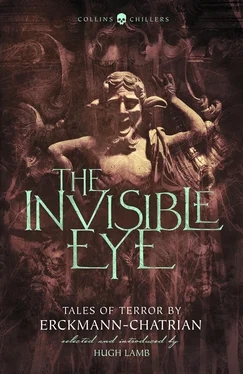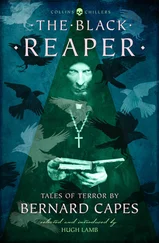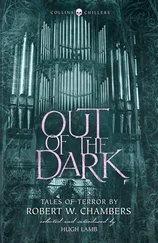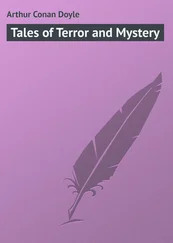He went by like a figure in a dream. I felt my eyelids heavy.
‘Let us drink,’ cried the organist.
The glasses clattered.
‘How well the Rhine sings! It sings the air of Barthold Gouterolf,’ said the son-in-law, ‘ ave-ave-stella! ’
No one made reply.
Far off, far off, we could hear the rhythmic beat of two oars.
‘Today,’ cried the old postmaster suddenly, in a hoarse voice, ‘Saphéri makes expiation.’
No doubt he had long been thinking, thinking of that. It was that which had rendered him so sad. My flesh crept.
‘He thinks of his son,’ said I to myself, ‘of his son who dies today!’
And a cold shiver ran through me.
‘His expiation,’ cried the daughter with a harsh laugh, ‘yes – his expiation!’
Theodore touched my shoulder, and, bending to my ear, said: ‘The spirits are coming – they are at hand!’
‘If you speak like that,’ cried the son-in-law, whose teeth were chattering. ‘If you speak like that I shall be off!’
‘Go then, go then, coward!’ said the daughter. ‘No one has need of you.’
‘Very well, I will be off,’ said he, rising.
And taking his hat off the hook in the wall, he went away with long strides.
I saw him pass rapidly before the windows, and I envied him.
How could I get away?
Something was walking upon the wall in front. I stared – my eyes wide open with surprise, and at length saw that it was a cock. Far off between the old palings the river shone, and its ripples slowly beat upon the sand of the shore. The light upon it danced like a cloud of sea-gulls with great white wings. My head was full of shadows and weird reflections.
‘Listen, Peter,’ cried the old woman, at the end of a moment. ‘Listen, you have been the cause of all that has happened to us.’
‘I,’ cried the old man huskily, angrily, ‘I! of what have I been the cause?’
‘Yes,’ she went on. ‘You never took pity on our lad. You forgave nothing. It was you who prevented his marrying that girl!’
‘Woman,’ cried the old man, ‘instead of accusing others, remember that his blood is on your own head. During twenty years you have done nought but hide his faults from me. When I punished him for his evil disposition, for his temper, for his drunkenness, you – you would console him, you would weep with him, you would secretly give him money, you would say to him, “your father does not love you; he is a harsh man!” And you lied to him that you might have the greater portion of his love. You robbed me of the confidence and respect that a child should have for those who love him and correct him. So then, when he wanted to marry that girl, I had no power to make him obey me.’
‘You should have said “yes”,’ howled the woman.
‘But,’ said the old man, ‘I had rather say no, because my mother, my grandmother, and all the men and women of my family would not be able to receive that pagan in heaven.’
‘In heaven,’ chattered the woman. ‘In heaven!’
And the daughter added in a shrill voice: ‘From the earliest time I can remember, our father has only bestowed upon us blows!’
‘Because you deserved them,’ cried the old man. ‘They gave me more pain than they did you.’
‘More pain! Ha! ha! ha! more pain!’
At that moment, a hand touched my arm. It was Blitz. A ray of the moon, falling on the window-panes, scattered its light around. His face was white, and his stretched-out hand pointed to the shadows. I followed his finger with my eyes, for he evidently was directing my attention to something, and I saw the most terrible sight of which I have a memory – a shadow, motionless, appeared before the window, against the light surface of the river. This shadow had a man’s shape, and seemed suspended between heaven and earth. Its head hung down upon its breast, its elbows stood out square beside the body, and its legs straight down tapered to a point.
As I looked on, my eyes round, wide opened with astonishment, every feature developed in that wan figure. I recognised Saphéri Mutz; and above his bent shoulders I saw the cord, the beam, and the outline of the gibbet. Then, at the foot of this deathly apparition, I saw a white figure, kneeling, with long dishevelled hair. It was Gredel Dick, her hands joined in prayer.
It would seem as though all the others, at the same time, saw that strange apparition as well as myself, for I heard them breathe: ‘Heaven! Heaven have mercy on us!’
And the old woman, in a low choking voice, murmured: ‘Saphéri is dead!’
She commenced to sob.
And the daughter cried: ‘Saphéri! Saphéri!’
Then all disappeared, and Theodore Blitz, taking me by the hand, said: ‘Let us go.’
We set off. The night was fine. The leaves fluttered with a sweet murmur.
As we went on, horrified, along the great Alley des Plantanes, a mournful voice from afar off sang upon the river the old German song:
‘The grave is deep and silent,
Its borders are terrible!
It throws a sombre mantle
It throws a sombre mantle
Over the kingdom of the dead.’
‘Ah!’ said Blitz, ‘if Gredel Dick had not been there we should have seen the other – the fearful one take Saphéri. But she prayed for him! The poor soul! She prayed for him. What is white remains white !’
The voice afar off, growing feebler and feebler, answered the murmur of the tide:
‘Death does not find an echo
For the song of the thrush,
The roses which grow on the grave,
The roses which grow on the grave,
Are the roses of grief.’
The horrible scene which had unfolded itself to my eyes, and that far-off melancholy voice which, growing fainter and fainter, at length died away in the distance, remain with me as a confused mirage of the infinite, of that infinite which pitilessly absorbs us, and engulfs us without possibility of our escape. Some may laugh at the idea of such an infinity, like the engineer Rothan; some may tremble at it, as did the burgomaster; some may groan with a pitiable voice; and others may, like Theodore Blitz, crane themselves over the abyss in order to see what passes in the depths. It all, however, comes to the same thing in the end, and the famous inscription over the temple of Isis is always true:
I am he that is.
No one has ever penetrated the mystery which envelops me.
No one shall ever penetrate it.
THE BURGOMASTER IN BOTTLE
I have always professed the highest esteem, and even a sort of veneration for the Rhine’s noble wine; it sparkles like champagne, it warms one like Burgundy, it soothes the throat like Bordeaux, it fires the imagination like the juice of the Spanish grape, it makes us tender and kind like lacryma-christi; and last, but not least, it helps us to dream – it unfolds the extensive fields of fancy before our eyes.
In 1846, towards the end of autumn, I had made up my mind to perform a pilgrimage to Johannisberg. Mounted on a wretched hack, I had arranged two tin flasks along his hollow ribs, and I made the journey by short stages.
What a fine sight a vintage is! One of my flasks was always empty, the other always full; when I quitted one vineyard, there was the prospect of another before me. But it quite troubled me that I had not any one capable of appreciating it to share this enjoyment with me.
Night was closing in one evening; the sun had just disappeared, but one or two stray rays were still lingering among the large vine-leaves. I heard the trot of a horse behind me. I turned a little to the left to allow him to pass me, and to my great surprise I recognised my friend Hippel, who as soon as he saw me uttered a shout of delight.
You are well acquainted with Hippel, his fleshy nose, his mouth especially adapted to the sense of taste, and his rotund stomach. He looked like old Silenus in the pursuit of Bacchus. We shook hands heartily.
Читать дальше












